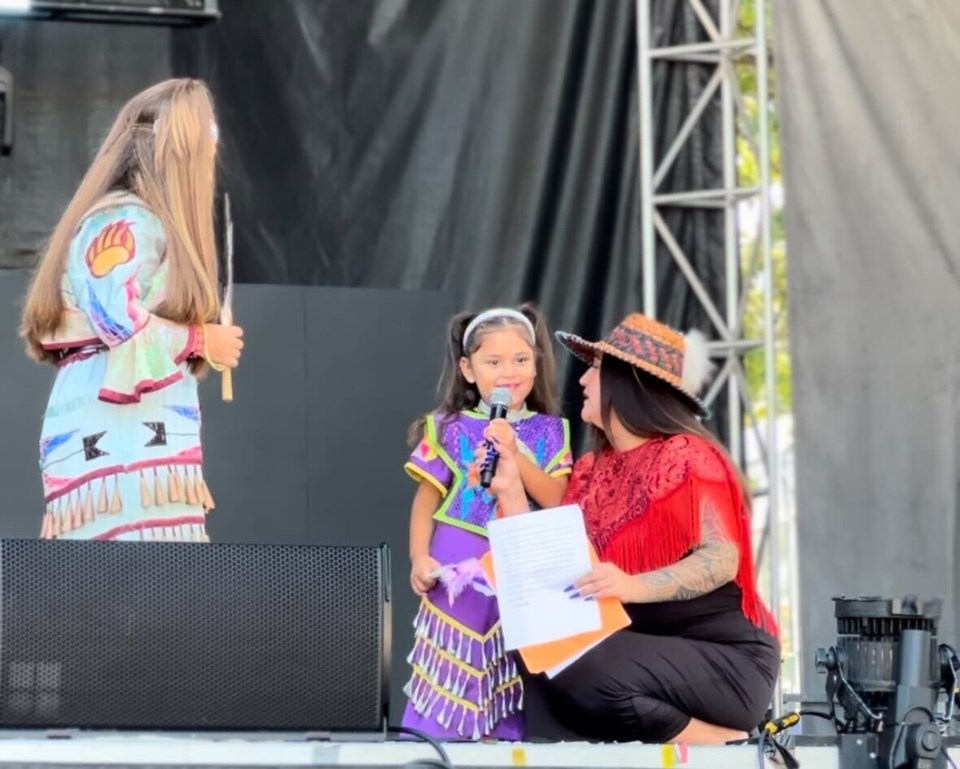Shayla Jacobs and her two young daughters, Sariah Jacobs-Green and Stella Jacobs-Harry took the stage at the PNE Fairgrounds on Aug. 30.
The Tatus Festival, named after the word for "star," was held on Aug. 30 and 31 as part of the PNE Fair.
, the festival aimed to celebrate Indigenous music, arts, and culture, offering a space for cultural expression and education. The PNE Fair itself attracts over 700,000 visitors annually, providing a broad platform for sharing Indigenous traditions with a diverse audience.
For Jacobs, a councillor of the Skwxwú7mesh Úxwumixw (Squamish Nation), performing alongside her daughters during the festival’s opening ceremony was deeply meaningful.
“It was such an honour to stand there with my two girls and perform the traditional welcoming on our Skwxwú7mesh Úxwumixw territory,” Jacobs said.
“As a single mother, raising my daughters with strong, rooted culture and traditions, it's a blessing to be in a political seat, paving the way for their future and sharing the stage with them.”
Heritage on Stage
Jacobs says her grandparents played a key role in teaching her about her culture.
“Culture is not just something I practise—it is my way of life. I was born into it. My grandparents, particularly my grandma, whose ancestral name is Slawia, and my papa, whose ancestral name is Pete Smuck, have been instrumental in my upbringing. Everything we do comes from a cultural perspective, and I am proud of who I am and where I come from,” she said.
The festival also reflected the broader values of the Nation. “When I think of the Skwxwú7mesh Nation, I think of family. We are all connected in some way. It also takes a community to raise a child; once our kids step outside our doors, they are safe within our community, thanks to the support of neighbouring families,” Jacobs said.
Jacobs also talked about the importance of preserving language, especially as her four-year-old daughter learns the Skwxwú7mesh language, which was once banned. According to a study in 2021, 13.1% of the Indigenous population reported being able to speak an Indigenous language well enough to conduct a conversation. “We lost a chunk of our culture and language for a time, but it is now revitalizing. My daughter comes home speaking our language—naming animals, numbers, and colours—and it is a big part of who we are. I am very proud of that,” she said.
Dancing through generations
Ten-year-old Sariah Jacobs-Green, who performed in a jingle dress, shared her thoughts on growing up in a culture she deeply values. “I've been performing since I was about four, so I wasn't too nervous,” Jacobs-Green, said, mentioning that her auntie Rosie, a champion powwow dancer, has significantly influenced her dancing.
Jacobs also pointed out that while the powwow dance her daughters performed is a borrowed tradition from the Prairie Nations, it resonates deeply with Indigenous people across Canada.
“The Squamish Nation is Coast Salish, so what my girls did today is part of that borrowed culture from the Prairie Nations. However, anything to do with regalia and the sound of the drumbeat connects to Indigenous people across Turtle Island.”
“We all walk with one mind and one heart, and that connection—through regalia, song, dance, and language—is the essence of who we are as Indigenous people,” Jacobs said.
As a councillor, Jacobs represents over 4,000 members of the Nation, many of whom live in within the District of Squamish.
Reflecting on her responsibilities, she spoke of the legacy she hoped to leave, rooted in the teachings of her grandparents, who were both residential school survivors.
Residential schools, which operated in Canada from the 1870s until 1996, aimed to assimilate Indigenous children by separating them from their culture. “The legacy I want to leave is truly the legacy of my grandparents,” Jacobs said.
Balancing her role as a community leader with single motherhood, Jacobs finds strength in her cultural practices. “Being a single mother of two girls is a gift. When times get tough, I turn to culture. I go for spiritual cleanses up in the mountains—that is how I brush myself off, regroup, and ask the Creator, whom I believe in, for strength and guidance. I ask them to wrap my children in a blanket of safety, security, and love. That is my self-care: culture. If I am not spiritual, cleansing in the water, I am at our cultural big house, where we sing songs, dance, and practise our culture. I believe everything happens for a reason, and I truly believe my girls chose me for a reason. I am very lucky to be a mom and very proud to instill my grassroots teachings in them. They are doing a really good job, and I'm incredibly proud of them,” Jacobs said.
Bhagyashree Chatterjee is The СÀ¶ÊÓƵ’s Indigenous affairs reporter. This reporting beat is made possible by the Local Journalism Initiative.




